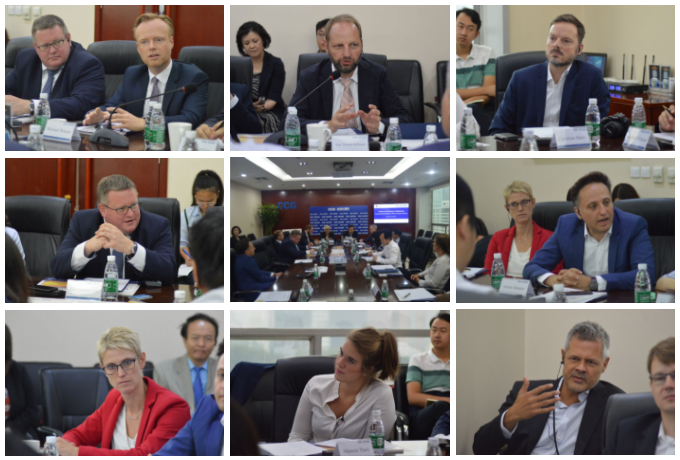German parliamentarian delegation visits CCG to discuss Sino-German cooperation in the digital era
August 20 , 2019Digitalization is changing all aspects of people’s daily lives. Germany has proposed ‘Industrie 4.0’ and the Digital Strategy 2025 to promote digitalization. Meanwhile, China’s digital economy has been developing rapidly in recent years.

On 20th August, a German parliamentarian delegation, led by Member of Bundestag and Deputy Parliamentary Leader Nadine Schön, visited the Centre for China and Globalization (CCG) to conduct in-depth discussions with CCG experts on several topics, including Sino-German cooperation on digital economy and the opportunities and challenges in Sino-German relations.
Jointly promote digitalization
Schön noted that people’s everyday lives have been improved due to the digitalization and applications of artificial intelligence. Germany has a strong tradition of scientific research for the development of industry. Germany also attaches great importance to cooperation with partner countries in the field of digitalization.

Schön said that China’s artificial intelligence and digital economy are growing rapidly. The legal environment is also continuously improving. Nowadays, many Chinese companies, such as Alibaba and DiDi, have strong capacity for new innovation.
Schön added that Germany has been continuing to seek ways of making digitalization better serve the economy and all sectors of society. She suggested that China and Germany should learn from each other in the process of industrial digitization and work together to promote progress.
Grasp the opportunities and avoid the risks
CCG Vice President Victor Gao pointed out that with the coming digital era, there are a lot of cooperation opportunities in the field of digitalization between China and Germany.
He noted that four core elements of the digitalization process include people, machines, application and connectivity. Language integrates these four elements together.
Gao said that it is better to gain benefits of digital transformation through a clear understanding of its advantages and challenges.
He also mentioned that the information revolution is a form of “destructive creation” which will cause unemployment but create new jobs opportunities as the same time. Thus, China and Germany should increase efforts to grasp the opportunities and avoid the risks.

Face the future challenges of digitalization
In response to how to address the future gap of the digitalization, balance the development of high digitalized and remote regions, regulate e-commerce and differentiate digital strategies between China and the US, CCG experts said that digital economy continues to develop and become an important force for China’s economic development. It also has capacity to reconstruct the employment market.

CCG experts added that e-commerce is seen as an effective way to deal with the issue of asymmetric information in the circulation of commodities. Digital economy would not only benefit small and micro enterprises but also could help rural and remote areas escape poverty.
CCG experts suggested that smart city projects would be a good platform that developed areas could share experience to help less developed areas cultivate more talent and so on. Moreover, technical skills training, business cooperation, communication and mutual interaction between various information platforms will improve the capacity of digital economy governance.
Regarding digital strategy, CCG experts said that China and the US share the same concerns on the issues of cross-border data flows and security preventives. Although China and the US have different views in the corporate governance, both countries share a common direction regarding the future of technology innovation in an open environment and in progressing digital economy.

The German parliamentarian delegation who attended the event included Thomas Heilmann, member of the German Federal Parliament and Christian Democratic Union (CDU) ; Markus Uhl, leader of CDU internet policy and digitalization working group; Jan Metzler, politician of CDU in the Bundestag, the German federal parliament; Ammar Alkassar, representative of the Saarland state government for strategy and innovation; Ulrike Fresenius, member of the German Federal Parliament, group head of Digital Agenda, the CDU/CSU parliamentary group;Christian Marx, member of the German Federal Parliament, group head of exchange of information, the CDU/CSU parliamentary group; Mareen Theil, member of the German Federal Parliament, director and the spokesman at Thomas Heilman’s office; Michael Winzer, chief representative of Konrad-Adenauer-Stiftung (KAS), China; Alexander Badenheim, representative of KAS, China; Nele van Zwamen, representative of KAS, China; Xu Ying, representative of KAS, China; Sebastian Steiner and Beste Beteiligungen, representative of Heilmann who is a member of the German Federal Parliament; Oliver Beste, general manager of GmbH Investment Company and Teresa Conrad, investor of GmbH Investment Company.
Also in attendance at the event were Miao Lu, CCG secretary general; Gong Jiong, professor of School of International Trade and Economics (UIBE) and CCG senior non-resident fellow; Xu Hongcai, professor and director of Information Department of China Center for International Economic Exchanges (CCIEE) and CCG non-resident senior fellow; Peng Lihui, secretary general of China Electronics Chamber of Commerce (CECC); Wang Huimin, researcher at Chinese Academy on International Trade and Economic Cooperation, Ministry of Commerce of the People’s Republic of China (MOFCOM) and Ann Tang, CCG deputy-secretary general.






